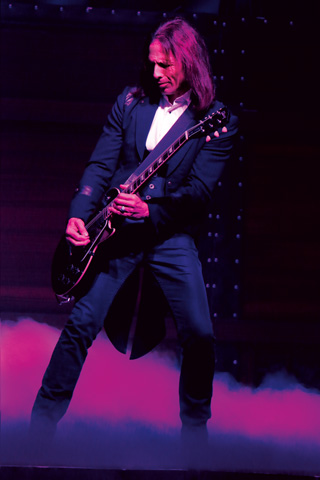Interview with lead guitarist Al Pitrelli — ‘My warmest memories are in the Pacific Northwest’

The Trans-Siberian Orchestra (TSO) is set to light up the Moda Center in Portland Sunday, Nov. 24, with two performances of their iconic show The Lost Christmas Eve. An afternoon matinee will begin at 2:30 pm, followed by an evening show at 7 pm.
Al Pitrelli — lead guitarist, composer and musical director of TSO — shared insights into the band’s music, its connection with fans, and his journey with the group.
A Special Connection to the Pacific Northwest
The Pacific Northwest holds a special meaning for Pitrelli, who describes the region’s audiences as warm, familiar and inspiring. “Every part of this country has something special about it, but the Pacific Northwest has a sense of calm and home for me,” Pitrelli says. He recalls memorable moments, including the first arena show TSO ever played at Portland’s Moda Center (then the Rose Garden) in 2001.
“That building will always be special to me. It was the first arena we ever performed in — it’s where everything started,” Pitrelli said.
He also recounts vivid memories, such as a New Year’s Eve show in Seattle where former Bad Company vocalist Paul Rodgers joined the group for four songs, followed by fireworks over the Space Needle. “These moments — the audience, the vibe, the topography — make the Pacific Northwest feel unique and unforgettable,” Pitrelli notes.
The Responsibility to ‘Repeat Offenders’
TSO has a deeply loyal fanbase, with many attending multiple shows over the years, affectionately called “repeat offenders.” Pitrelli explains how this dedication drives the group to continually improve. “We owe them a better show every year,” Pitrelli says. “You never want someone to leave thinking, ‘It was better last year.’ The goal is to blow them away every time.”
Comparing their process to a Super Bowl-winning team, Pitrelli described how TSO approaches every new production as an opportunity to rebuild and innovate. “We want every fan — especially those bringing new people — to leave saying, ‘Wow, that was incredible,’” Pitrelli says.
“I owe them a better show every time,” Pitrelli adds. “Their support is the reason we keep pushing the limits.”

Honoring Paul O’Neill’s Vision
TSO’s ongoing success is deeply tied to the vision of its late founder, Paul O’Neill. The band has sold over 20 million tickets and donated over $20 million to charity — a milestone that reflects O’Neill’s commitment to making a difference. “Paul wanted to change communities on a foundational level,” Pitrelli says. “It wasn’t about grand gestures but about consistent, meaningful contributions. That legacy inspires everything we do.”
Fans often describe TSO’s performances as spiritual, a sentiment Pitrelli deeply values. “Good,” he says. “That means we’ve done our job. It’s an honest, vulnerable moment. I think that’s what people connect with — this shared human experience. None of us are exempt from the emotions in these stories. I relate to the songs as much as someone in the 13th row does.”
Pitrelli emphasizes that TSO’s goal is to unify the audience through shared experiences. “When you’re in that theater, surrounded by thousands of others who also feel loss, hope and joy, you realize you’re not alone. That connection is what makes this show so special.”
A Cinematic Approach to Music
When asked how his role as a music director and guitarist has evolved, Pitrelli attributes much of his approach to his upbringing and early exposure to music. “Growing up in the ’60s, I was surrounded by all kinds of music — Frank Sinatra, Motown, The Beatles, Leonard Bernstein’s West Side Story — and it shaped the way I think about arrangements. For me, it’s not just about playing guitar; it’s about serving the song and creating a soundtrack for a story.”
This cinematic approach has been central to TSO’s success, blending rock, classical music and theatrical storytelling to create a truly immersive experience. “We want to take the audience on a journey, offering them two hours of escapism and leaving them with a meaningful message,” Pitrelli says.
Finally, Pitrelli shares his hope for how TSO’s music can inspire younger audiences. “The magic of TSO is that it blends the familiar with the extraordinary. For students and younger fans, it’s a chance to see what’s possible when you combine creativity, storytelling, and music. We want to spark something in them — to show that art, in any form, can touch lives and leave a lasting impact.”



